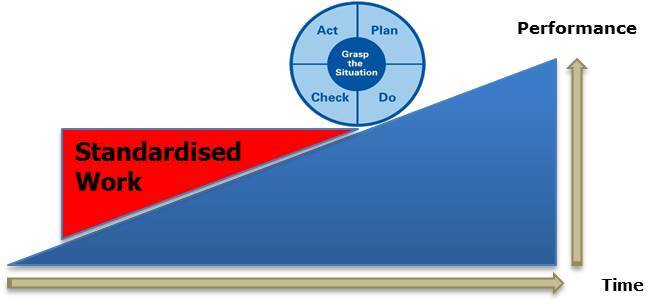Standardised Work is one of the most powerful and well-known Lean tools and is core to any organisation that is serious about improving their business performance. By documenting the current best practice, standardised work helps form the baseline for kaizen or continuous improvement. As the standard is improved, the new standard becomes the baseline for further improvements, and so on. Improving the work moving from one standard to the next improved standard then becomes a never-ending process.
Despite the popularity of standardised work it is often misunderstood, under-utilised and many organisations have numerous challenges in applying Standardised Work as a foundation for continuous improvement.

So why is standard work so important?
Art Byrne (former general manager at the General Electric Company, group executive, of Danaher Corporation and CEO of The Wiremold Company among others) writes on a regular basis for The Lean Post and said of Standard Work:
“People often have a hard time with the idea of standard work. They complain that they are not robots, that everyone is different with different capabilities. They are suspicious about efforts to have different people do the same job the same way—and in fact worry that it’s a veiled attempt to have a basis for firing people. Having done lean for more than 30 years, I can state emphatically that this is not the case. This is a huge misconception about lean (done right). Creating meaningful standard work is nothing more than a recognition that the best asset any company has is its people. Standard work is essential for growing your people and improving their skills.”
In an article entitled The Next Three Challenges for Lean Management, talking about the challenges facing Lean in the digital age, for the Lean Global Network online journal Planet-Lean, our chaiman Daniel T Jones writes:
“The reality is that, as we become masters, we can work together to standardize routine activities and, in doing so, free up time for creativity. Agreeing on a set of guidelines and procedures that can help us make sense of the processes we run will remove the frustration that comes from fire fighting. With it, we will also eliminate the distractions and misunderstandings that take so much of our time, make our work so difficult, and actually pose a threat to our creative drive.
Perhaps the issue lies in the definition of the creativity. To me, creativity means knowing how to combine standard elements into a new solution.
Standards build shared knowledge, and ensure routine activities don’t take too much of our time. They don’t detract from creativity; they enable it.”
And at the UK Lean Summit 2015, Keith Edwards and Ian Hurst ran a learning session on TPS Fundamentals, the Role and Development of Standardised Work. Afterwards they sat down for an interview and commented:
“Too often organizations try to standardize an unstable process, which is of course very difficult to do. Without stability your standardization efforts will fail, there is no question about that.
The foundation must be problem solving, which is what Toyota has essentially spent 80 years doing. Problem solving gives us the level of stability that we need to introduce standardized work cycles and improve. Just-in-time and jidoka help us to expose the next level of problems, or “create a crisis” if you will.”
So as you can see, Standardised Work is an essential for any Lean transformation!
On Wednesday 21st and Thursday 22nd September 2016, a 2 day workshop at our offices in Goodrich (around an hour from Cardiff, Bristol and Birmingham) on Standardised Work.

Why not join us to see how our current practices can be improved and learn how to:
- Understand the fundamentals of Standard Work and its importance in the foundation of a Lean management system.
- Prepare standardised work forms.
- Introduce standardisation techniques to improve:
- Training
- Waste elimination
- Sustainability of improvements
- Predictability of results
For more details visit www.leanuk.org – you’ll even receive a free copy of Kaizen Express by John Shook upon registration.
Other workshops available. Visit our events page for more details
Registration for the UK Lean Summit 2016 now open. View the full program here